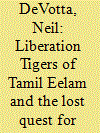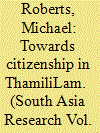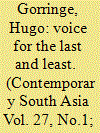| Srl | Item |
| 1 |
ID:
093188


|
|
|
| 2 |
ID:
117927


|
|
|
|
|
| Publication |
2013.
|
| Summary/Abstract |
In establishing the de facto state of Thamililam from 1990 onwards, the LTTE eliminated most of its Tamil rivals and mobilised the Tamil people for war in demanding ways. Despite its fascist character the Tiger state received the support of its subjects because it was understood to be a bulwark against Sinhala domination and the repository of sturdy Tamil nationalism, while the LTTE's propaganda cultivated a devotional aura around its mavirar (heroic dead).
This article highlights the strength of Tamil nationalism by interweaving this dimension within empirical details that outline Tamil political shifts and processes of migration from the 1970s to the 2000s. The centre of gravity in Tamil politics shifted first in the 1970s from a Colombo-Jaffna axis to a Jaffna-centric one and then from the Jaffna Peninsula to the Kilinochchi-Mullaitivu locality in 1995-96. The second spatial shift underpins the argument that the people under the LTTE were citizens of Thamililam. In technical terms they were dual citizens because they were also citizens of Sri Lanka. Where the latter claim was pressed-as it was, from different perspectives, by both the government of Sri Lanka and human rights advocates-one encountered a hegemonic imposition that denied the subjective feelings of those living within the de facto LTTE state. They were citizens of Thamililam. As such, they were enemies of Sri Lanka.
|
|
|
|
|
|
|
|
|
|
|
|
|
|
|
|
| 3 |
ID:
165250


|
|
|
|
|
| Summary/Abstract |
Between 2009 and 2014, Thirumavalavan, the leader of the largest Dalit party in Tamil Nadu, served as an MP in Delhi. This paper draws on research with the Viduthalai Chiruthaigal Katchi (VCK or Liberation Panther Party) to raise a number of key questions about representation and democracy in a multi-level federal system. Although they are a minor party, their experience of national politics offers insights into the workings of party systems in India. The paper considers the extent to which they are constrained by alliance partners and political rules-of-the-game. It then considers the question of representation, and asks what the VCK managed to achieve in Thirumavalavan’s constituency of Chidambaram and the extent to which they could raise issues at the national level both through formal and disruptive means. Finally, the paper reflects on the advantages and disadvantages for a small party of having a foothold in the Centre and draws out the lessons of the VCK’s experience for our understanding of Indian politics.
|
|
|
|
|
|
|
|
|
|
|
|
|
|
|
|